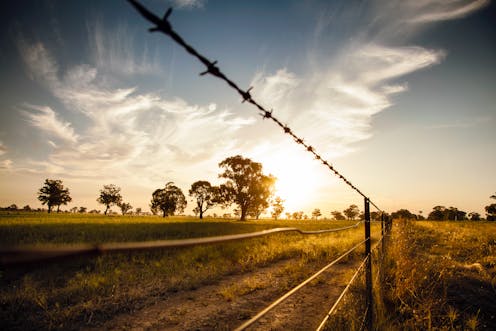The Morrison government wants farmers to profit from looking after the land – but will anyone want to pay?
- Written by Felicity Deane, Associate Professor, Queensland University of Technology

The richness of Earth’s plant and animal species is rapidly declining. In Australia, responsibility for this biodiversity loss lies in many quarters – including agriculture.
To help address the problem, the federal government is pursuing a “biodiversity stewardship” policy to encourage farmers and other landholders to adopt practices that benefit native species, by financially rewarding them for their efforts.
Farmers who restore, enhance or protect biodiversity will receive credits, which can then be sold on private markets.
But a bill before parliament reveals the scheme devised by the Morrison government is potentially problematic. It may fail on two counts: to protect biodiversity and to create new income for farmers.
Will demand meet supply?
The government says farmers already help maintain biodiversity, but to date have not earned income from these efforts.
The bill[1] allows for the supply of tradeable biodiversity “certificates” issued by the government to landholders who, for example, plant native tree species or actively manage their land to protect existing vegetation.
Introducing the bill to Parliament, Agriculture Minister David Littleproud said it would:
“position Australia’s national biodiversity market as a trusted way to invest in robust and assured biodiversity benefits […] It will bring together interest from farmers, on the supply side, and corporate and philanthropic buyers, on the demand side.”
But in reality, there is no guarantee demand for the credits will meet supply.
Biodiversity credits are not products that a business or person needs. Unless a business is seeking to actively boost its environmental credentials, demand for biodiversity credits comes largely[2] from government intervention.
The experience of the United Kingdom shows how governments can create genuine demand for biodiversity credits. In 2021, the UK passed legislation declaring a net gain in biodiversity was required before a development could receive planning permission[3].
It means, for example, a project which requires cutting down native trees could buy biodiversity credits from farmers to not just compensate for the damage, but leave nature in an overall better state.
No such “net gain” mandate exists in Australia. But federal environment law does include requirements for projects to offset[4] damage caused.
The market proposal for Australia’s biodiversity credits makes reference[5] to this. But it overlooks one important factor.
Under federal law, offsets only apply where the actions to boost biodiversity directly benefit[6] the part of nature being damaged.
For example, say a housing project requires destroying a forest where koalas live. That damage is only offset if that same type of forest is planted or restored somewhere else where koalas will benefit.
But under the proposed biodiversity stewardship scheme, credits will represent different projects – and therefore different environmental benefits. In industry speak, such credits are known as “non-fungible”.
This runs a real risk that the credits on offer from farmers may not match what the market wants.
Read more: A major report excoriated Australia's environment laws. Sussan Ley's response is confused and risky[7]
A subsidy by another name?
Another option proposed under the bill involves the government directly purchasing biodiversity credits – at a potential cost[8] of A$2 billion dollars a year for the next 30 years.
Direct government funding of such schemes is not without merit. Biodiversity is a public good[9] and the benefits of conserving it are widespread. So the conservation costs must be similarly spread.
But such funding means the biodiversity market proposal could be considered a subsidy scheme – and so may be seen as flouting global trade rules.
The government has been at pains to emphasise the bill is not about displacing prime farmland. Actions for which farmers are paid are intended to take place on land that’s not agriculturally productive.
But under World Trade Organisation rules, agricultural subsidies[10] can only replace existing income. So, if the Australian government foots the bill for credits, the scheme suddenly resembles a subsidy which is disallowed under our global obligations[11].
And finally, direct government funding of the scheme means costs will be borne across the taxpayer base, instead of by those causing the worst damage (and profiting from it).
Looking ahead
The dissolution of parliament ahead of the federal election means the bill has lapsed. We can assume a re-elected Morrison government will reintroduce it.
Labor has promised[12] to reform land management if elected. It’s unclear whether it would support the biodiversity credits scheme as proposed by the Coalition, however it will be under pressure[13] from the Greens to make the measures more robust.
More broadly, creating a market for biodiversity credits is only a very small step in what’s needed to reverse biodiversity loss in Australia. Real change requires a paradigm shift, in which environmental damage forms part of the costs of a project – and influences decisions about whether it’s viable.
This will mean making tough decisions that disadvantage powerful industries, such as mining.
And as Australians head to the polls, we need a government with a big strategic vision to achieve genuine biodiversity conservation. This requires a national plan, rather than considering projects in isolation.
Because if history has taught us anything about environmental problems, it is that they compound over time – to the point they’re very difficult to reverse.
References
- ^ bill (parlinfo.aph.gov.au)
- ^ comes largely (link.springer.com)
- ^ planning permission (www.legislation.gov.uk)
- ^ offset (epbcactreview.environment.gov.au)
- ^ makes reference (parlinfo.aph.gov.au)
- ^ directly benefit (www.awe.gov.au)
- ^ A major report excoriated Australia's environment laws. Sussan Ley's response is confused and risky (theconversation.com)
- ^ cost (parlinfo.aph.gov.au)
- ^ public good (theconversation.com)
- ^ agricultural subsidies (www.wto.org)
- ^ global obligations (research.senedd.wales)
- ^ promised (www.farmonline.com.au)
- ^ under pressure (greensmps.org.au)

















